The Daily Agenda: The first of many
"Let's do this shit" is one way to go ... Get your free trip to D.C. now ... And Twitter will debunk him for free.
The state executed its first death-row inmate yesterday after eight years without executions.
And because the lethal injection wasn’t botched, like the last execution in 2014 was, the state will start chipping away at the large backlog of people facing the death penalty.
Clarence Dixon, a 66-year-old man who was mentally ill and legally blind at the time of his execution, was convicted of the 1978 murder of ASU student Deana Bowdoin. Her sister said the decades of court hearings have taken a toll on her.
"This is finality for this process. It's relief. It was way, way, way too long," Leslie Bowdoin James, Deana’s sister, said, according to the Republic’s accounting of the execution.
The death was the culmination of the state’s quest to return to executions and the end of the line for years of legal processes that needed to be exhausted in Dixon’s defense.
Before his execution, Dixon ate a last meal of Kentucky Fried Chicken, strawberry ice cream and water. In his last statement, he insisted he was innocent before saying, “let's do this shit.”
Protesters outside the Florence prison spoke out against the death penalty and gathered in prayer.

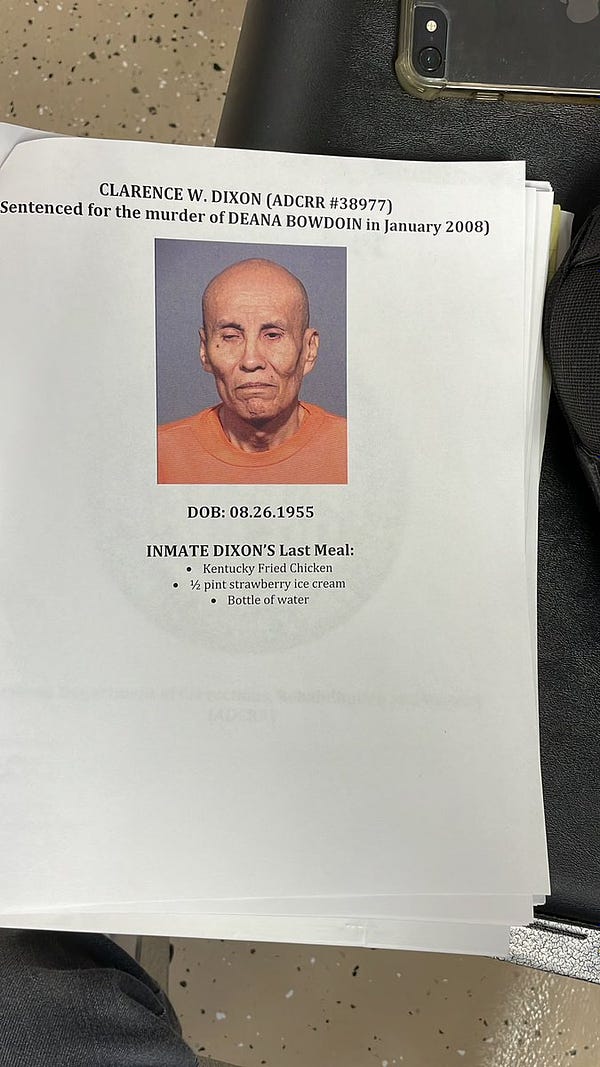
Witnesses to the execution said it took 25 minutes to find a spot where they could successfully insert an IV, and they eventually put one in his groin. He mentioned Deana’s name while doctors tried to put in an IV, but stared at the ceiling instead of at witnesses, Fox10’s Troy Hayden, who witnessed the execution, said.
“Maybe I'll see you on the other side, Deana. I don't know you. I don't remember you,” he said in his last words, according to Hayden.
But after he received a lethal dose of pentobarbital, he appeared to die quickly, media witnesses said. And that will likely play into the state’s arguments in subsequent execution cases — the method was swift and successful. Still, defense attorneys and advocacy groups have noted, and likely will continue to, that the doses of pentobarbital have a short shelf life and dosage amounts are imperfect.

A two-drug cocktail used to execute Joseph Wood in 2014 took two hours and 15 doses while Wood gasped for air. Since then, the state searched for execution drugs, often unsuccessfully, before landing on a one-drug compound pentobarbital, though the expiration date of that drug became a subject of court hearings, too. The state also revamped a gas chamber that could be used for future executions.
Dixon is just the beginning. Frank Atwood, convicted of the 1984 kidnapping and killing of an 8-year-old girl, is set to be executed on June 8. His lawyers are now going through the legal steps to try to prevent or delay his execution, just as Dixon’s did.
The Arizona Department of Corrections shows 112 people currently on death row. The state says there are more than 20 people on death row who have “exhausted their appeals,” according to the Republic’s Jimmy Jenkins.
They’re dealmakers: Democratic U.S. Rep. Raul Grijalva is asking federal prosecutors to investigate a potential political pay-to-play racket between Arizona businessmen and the Trump administration over a long-contested development near Benson. Based on whistleblower complaints, Grijalva and other Dems with oversight over the U.S. Department of Interior allege developer Mike Ingram1 had an off-the-books breakfast with the department’s second-in-command who then personally pressured U.S. Fish and Wildlife to back off their argument that the development needed Army Corps of Engineers approval, the Politico reports. Shortly after, Ingram, former Phoenix Suns owner Jerry Colangelo and a bunch of other Arizona bigwigs donated to Trump’s re-election committee and Fish and Wildlife issued the permits to build. (The development has since been halted.)
So much for elections: Ted Simons wrangled the six Republicans running for their party’s nomination for Arizona attorney general in a debate last night on “Arizona Horizon.” The half-dozen Republicans offered few policy divides, but stark personality differences. They all supported the death penalty, for example, but former Maricopa County prosecutor Abe Hamadeh was super stoked about Clarence Dixon being put to death yesterday, while attorney Dawn Grove called it sad but justice, and former Arizona Supreme Court Justice Andrew Gould, who has actually sentenced people to death, called it “the law.” Rodney Glassman’s nauseating attempts to steal the spotlight was perhaps the highlight.
“No Rodney. No. It’s not your .... No. No. Rodney. Rodney. Rodney. Please. Can you… Can you… Thank you,” Simons said.

Per capita, that’s less than 600 potential frauds statewide: Yuma County Sheriff Leon Wilmot, a Republican, announced that his office is investigating 16 cases of potential election fraud, the majority of which are duplicate voting in multiple jurisdictions. Other potential crimes include voting for others, including dead people, sending in false voter registration forms, and requesting a mail ballot for someone else and filling it out.
Bullshit don’t come cheap: The latest batch of public records turned over in the audit shows that the audit cost far more than expected and far more than it brought in from the state Senate and Trump adjacent conspiracists, the Arizona Mirror’s Jerod MacDonald-Evoy writes. That’s totally unsurprising, considering seemingly every grifting election conspiracist in the nation was able to con their way onto the team, which is now fighting amongst itself over who owes who money, the Republic’s Ryan Randazzo and Mary Jo Pitzl note.

Today in attack ad previews: U.S. Senate GOP primary contender Blake Masters says the gender pay gap is a “left-wing narrative” because men do the risky, high-paying jobs like being cops and deep-sea fishermen. NBC’s Vaughn Hillyard got the video and Masters thanked him on Twitter, saying “everyone knows I am right here and this clip makes me look good lol.”
The small media organization owner pay gap, a left-wing narrative we just made up, is hitting us hard. Please subscribe for just $80 per year.
Even with 60 Dems, they’d fail: Democrats in the U.S. Senate failed to muster the 60 votes needed to pass legislation to enshrine abortion rights in law following the leak of the U.S. Supreme Court draft decision in Dobbs v. Jackson Women’s Health Organization. Arizona’s U.S. Sens. Mark Kelly and Kyrsten Sinema voted for the measure, the Republic notes. Democratic Sen. Joe Manchin was the only Democrat to buck his party.


No such thing as a free ride: Gov. Doug Ducey sent a letter to social media companies asking them to do more to stop Mexican cartels’ attempts to recruit children into becoming “coyotes” or drug smugglers. Journalist Kevin Sieff penned a deeply reported piece on the phenomenon for the Washington Post and This American Life last year. Ducey is also taking a page from Texas Gov. Greg Abbott by announcing Arizona will now offer asylum seekers a free one-way ticket to Washington D.C.
What happens at Lake Mead doesn’t always stay in Lake Mead: It’s not just mafia victims’ bodies turning up in Lake Mead, USA Today’s Trevor Hughes writes, but officials believe more will continue surfacing as the water recedes.
"This is just the tip of the iceberg," said Travis Heggie, a former National Park Service official who has studied deaths at Lake Mead Recreation Area. "I'm expecting all sorts of criminal things to show up, and I mean a lot."
That “Stephanie Grisham” Google alert is still paying off: Early in his single term, former President Donald Trump was obsessed with the idea that China had a “hurricane gun” that it was using to create and direct hurricanes at the U.S., and he wanted to bomb China in retaliation, Rolling Stone reports. Former Arizonan and White House Communications Director Stephanie Grisham said she hadn’t heard that one, but “that does not surprise me at all.”
Look on the bright side: As the Arizona Board of Regents announced another round of tuition increases, Nikhil Dave, one of Ducey’s ABOR student appointees, argues in the Republic that it could always be worse.
Your daily dose of existential dread: ProPublica asked Southwest climate scientists about what the future holds for the region, and their answers were predictably depressing.
We previously noted Republican lawmakers’ attempt to make sure that if the State Bar of Arizona investigates a lawyer and doesn’t find they committed a crime or ethical breach, the investigated attorney can recoup costs for their legal fees, investigation costs and “any loss of future earnings and damage to the attorney's reputation.”
Republican Sen. Vince Leach, who sponsored Senate Bill 1566, argued this particular idea sprung from what he calls the “weaponization of the Bar” via politically motivated bar complaints into a dozen lawyers at Attorney General Mark Brnovich’s office, including the one against Brnovich that ended in a settlement agreement.
The bill got stuck in the House until lawmakers removed the most problematic portion, that lawyers could recoup loss of future earnings and damage to their reputation, which opponents argued was vague and could amount to extensive fees. Gov. Doug Ducey signed the watered-down version into law this week.
Among the many superfluous payments the state paid to election grifters working the state Senate’s audit, there was one that stands out.
In between taking time to spread disinformation to high school kids, self-proclaimed email inventor Shiva Ayyadurai found the time to bill Arizona $2,500 to debunk claims made by self-proclaimed CueCat inventor (unlike email, CueCat made Times’ “50 worst inventions” list) Jovan Pulitzer, who was also on the payroll.

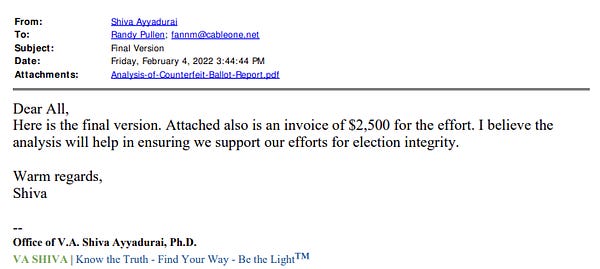
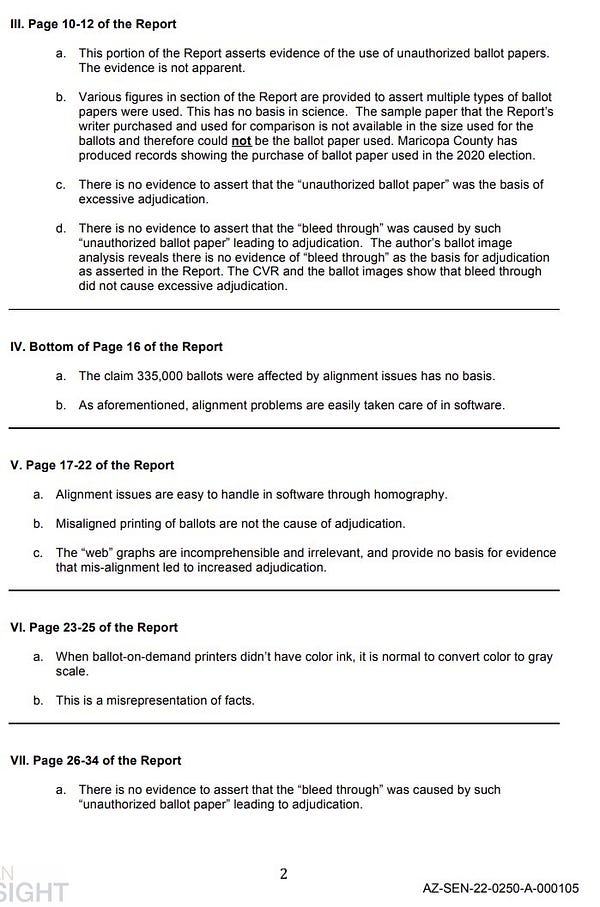
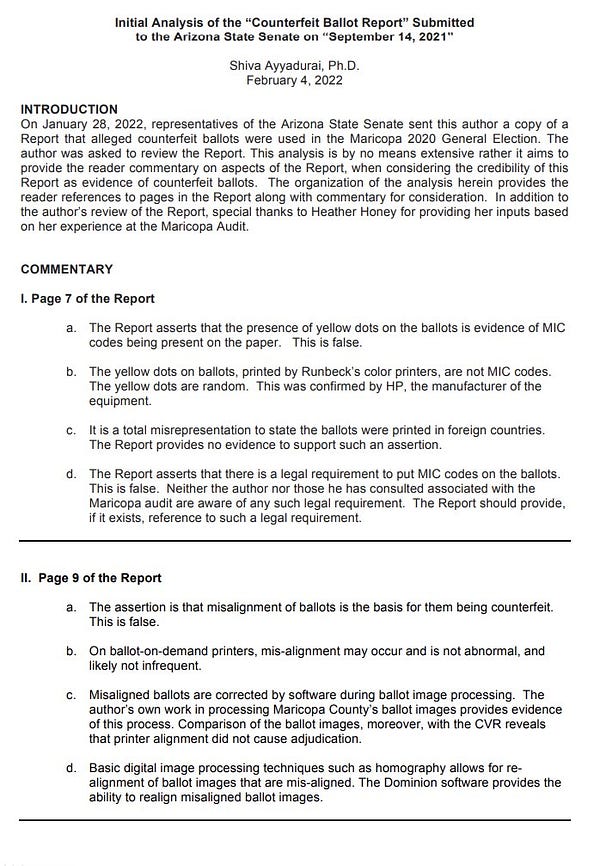
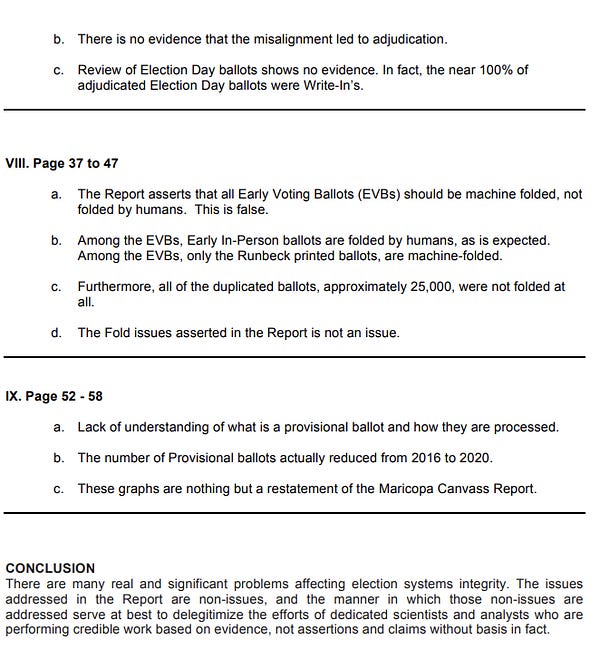
Ingram’s political maneuvering to build the golf course development extends down to the Arizona House. In 2016, we spotted then Speaker of the House David Gowan in Ingram’s front-row seat at a Diamondbacks game while Gowan was pushing legislation to help the development overcome local opposition.







About Shiva and email: he wrote an application and gave it the name "email". Email itself was a generic capability and had been a thing for years before that (though since this was the 70s, its use was far more limited than it is today). As Wikipedia notes, "In 1971 the first ARPANET network mail was sent." I recall using it in a university network in the mid-1970s (as well as "talk", which was an early IM application), and I think some companies had email applications then as well. Shiva's work in the late 70s to 1980 was certainly an achievement for a teenager, but it was a far cry from being the first in that space.